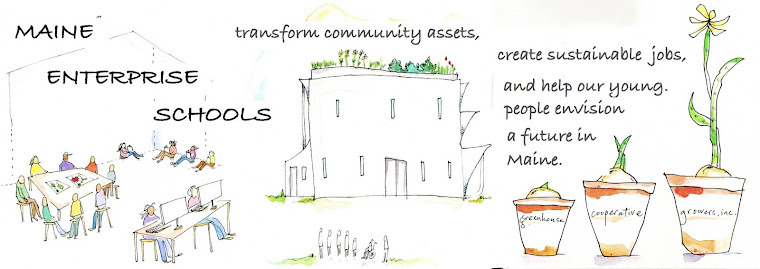I write with regret to announce that Maine Enterprise Schools is, at least for now, going on hiatus. There are two reasons. We’ve not been able to secure an agreement with a public school district for a 2011 launch, despite getting very close several times. And our non-profit partner, LearningWorks, has decided that the small autonomous public schools that we seek to create are not consistent with their long-term strategy.
In both cases, the promise of charter school legislation may, somewhat paradoxically, be working against the theory of action we’ve been advocating: that public schools themselves are better off leading innovation than having it forced upon them.
I’ll post a longer entry at innovationmaine.blogspot.com; suffice it to say that we tried just about every available avenue to realize our mission. After more than two years of exciting and challenging work, the stars (and finances) are simply not aligned for the kind of integrated model we advocate.
This does not mean that our efforts have been for naught. Our work has influenced the debate around school reform at the state level and in individual schools and districts in Maine. Some of the non-profit partners we’ve worked with are adopting/adapting aspects of the asset-based, sustainable economic development approaches we’ve championed. Most importantly, we’ve been able to bring together LOTS of people from across many sectors to imagine something quite different for Maine’s young people.
MES assigned itself a daunting challenge: to create systemic change in education, commerce and the environment using existing community assets. These assets – the people, places, buildings, and systems - are inevitably tied to tradition, and in turn to organizations or institutions. Even though the fundamental assumption that existing resources can produce better results if allocated differently is one that most folks can see the wisdom of, the actual reallocation of those assets requires the willing participation of the gatekeepers of those organizations and institutions. Ultimately, we were unable to convince those folks that the benefits of doing so now outweigh the cost of not doing it.
Now marks a point of change for MES. For the short term, we plan to refocus our energies on the enterprise incubator and “blended value” investment aspect of the original MES vision. To this end, we hope to gather folks who genuinely support our approach and want to help us figure out how best to capitalize on the work we’ve done. In early April (time and place to be announced) we’ll host a “where we’ve been, where we’re at, and where we’re going” meeting.
If you want to be at that meeting, please let us know. In keeping with the MES collaborative approach, the more voices the better. Send an email jdanieri@mainefarmschool.org, - a simple, "I'm in" will work. And of course we welcome lengthier feedback anytime.
William Faulkner wrote, “All of us failed to match our dreams of perfection. So I rate us on the basis of our splendid failure to do the impossible.” My most genuine thanks and appreciation to everyone in the MES community for joining me in what has been a splendid, if for now incomplete, quest.
John D'Anieri
